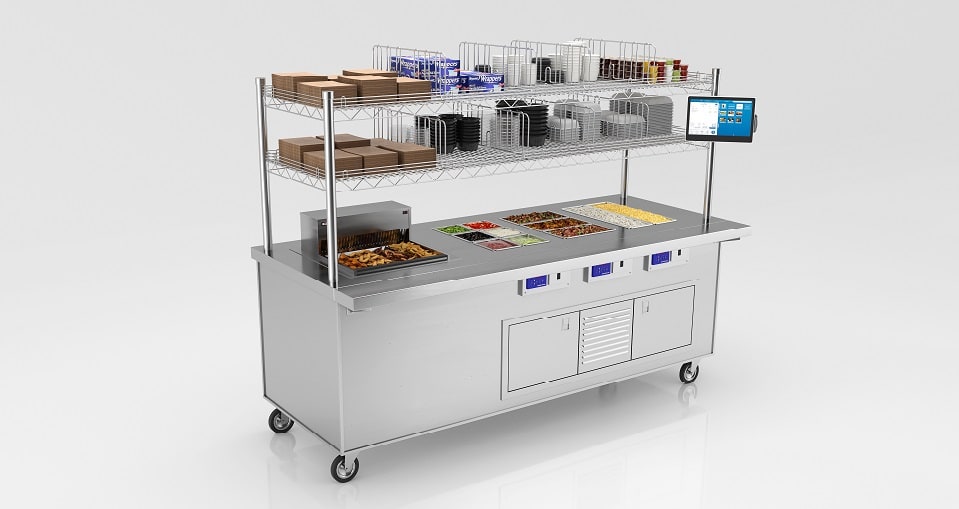
The coronavirus pandemic has taught every facet of foodservice that the way things have been done is likely not the way they will always be done. Whether from pandemic or natural catastrophe or economic or cultural forces or circumstances unforeseen or unimagined, massive disruption may strike again and demand adaptation.
Because the future — and even to some extent, the present — of foodservice is unknown, specifying today for tomorrow’s kitchens demands a healthy dose of expecting the unexpected. Flexibility, it’s safe to say, will be key.
Here are a few ideas:
1. Consider adaptable equipment
Equipment installed specifically for one set of circumstances — say, a cooking or prepping station designed for particular menu items — may be become at best unwieldy and at worse unusable in the face of intense change.
Forward-thinking operators should design kitchens with adaptability at their core.
For example, introduce planned rotating stations — prep and holding areas created to accommodate a changing menu. Pizza one day, poke the next. This approach prevents future menu fatigue by building for variety from the outset.
Planning for adaptability also includes selecting equipment whose very features provide for flexibility.
LTI’s patented QuickSwitch wells and QuickSwitch Ceran glass shelves allow food to be served hot, cold or frozen with each well (or shelf) controlled independently, so that hot soup can be safely and conveniently held next to those cold sandwiches.
And because wells can change temperature in an hour, converting from a hot prepared foods bar to a serving counter for cold packaged foods can be accomplished with the flip of a switch.
2. Give equipment more jobs
Equipment that has multiple possible uses will provide savvy operators with more options when it comes to cooking and serving.
Most everyone is familiar by now with the likes of combi-ovens and other multipurpose cooking appliances, but flexible serving options are also being developed to support today’s unique needs and whatever the future may hold.
A major pivot to delivery and takeout orders is changing how restaurants operate. LTI’s QuickSwitch order assembly table serves as a dedicated station for preparing and packaging these to-go orders, keeping this process from interfering with the main line.
With wells that can easily switch between hot and cold and convenient shelves to hold packaging materials, this self-contained unit functions as a fully equipped, standalone station. In the future, the table can be repurposed to support any normal line as needed or continue to support delivery if these services stay in high demand even beyond the pandemic.
3. Choose changeable equipment
The rapid change in safe serving standards impacted many facilities’ basic functions. Restaurants and other dining operations had to put away shared utensils as at a salad bar or even utensils shared between workers in order to limit the number of frequently touched surfaces. Buffets and other self-serve scenarios were strictly off-limits in most cases.
But serving counters, with their stationary food shields and customer-centric orientation, often weren’t ready for the change and had to be retrofitted, sometimes in less than ideal ways (like the barbecue restaurant in South Carolina that improvised by stretching plastic wrap across the front of its buffet).
To make shifting easier, operators should consider food shields that can be switched from self-serve to full-serve — or even from full-serve using utensils to safe holding for packaged foods, which can be picked up without requiring interaction between diners and workers.
Adapting to an unprecedented present and planning for an unknown future can make anyone wish for a functioning crystal ball, but consultants can help their clients boost the chances to be ready for whatever comes next by embracing adaptability and flexibility at every turn.
About LTI, Inc.
LTI is a third-generation family owned and operated foodservice equipment manufacturer located in Jonesboro, Georgia. With an emphasis on solid engineering and innovative design, LTI is an established leader in food serving solutions. Custom fabrication and counterwork combined with cutting-edge serving technologies give customers the solutions they need.
LTI was founded in 1947 and continues its commitment of creating high-quality, American-made products built with superior craftsmanship. LTI is changing how food is served. Learn more at www.lowtempind.com.




